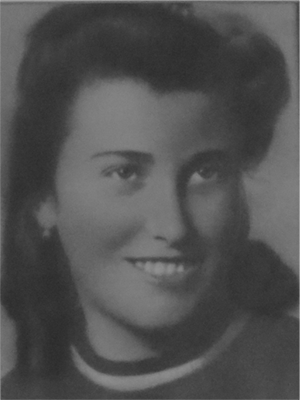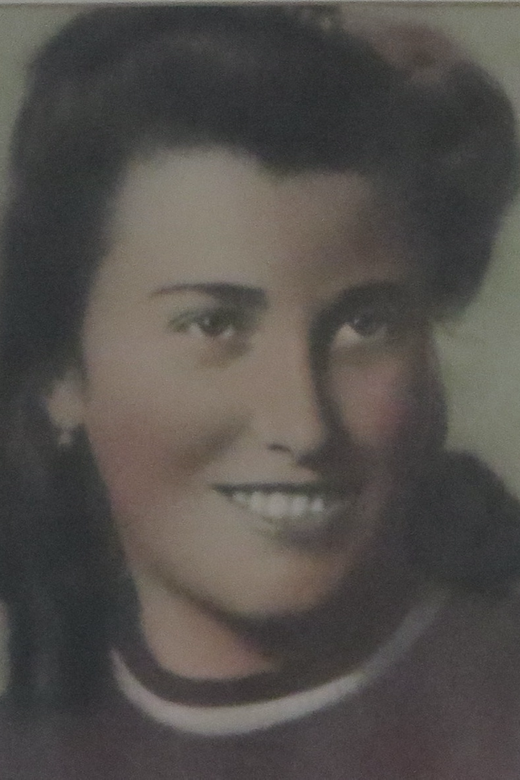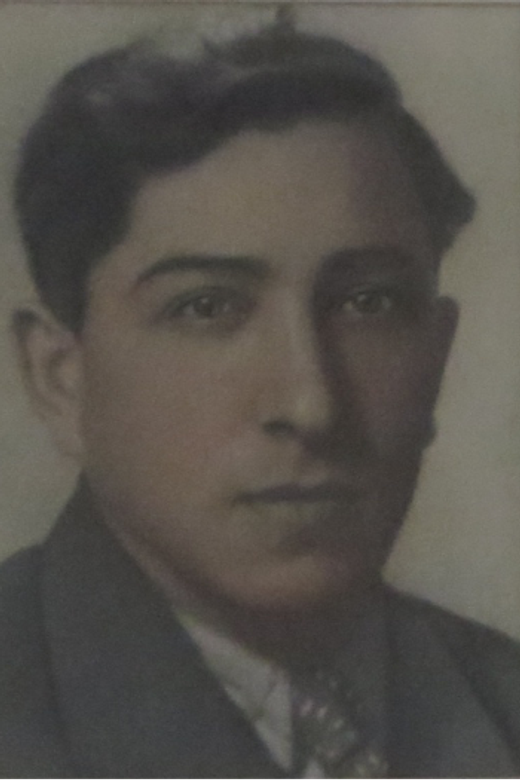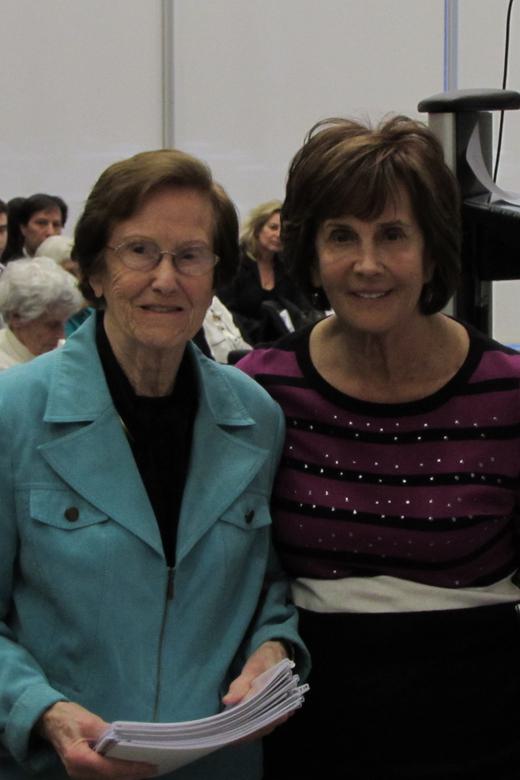Molly Shidlowski

Born: Stopnica, Poland, 1922
Wartime experience: Ghetto and camps
Writing partner: Florence Cohen
Molly (Malka) Shidlowski (née Sztrozberg) was born in Stopnica, Poland, in 1922. Immediately after the German army invaded Poland in 1939, it entered Stopnica and began to carry out atrocities, killing Jews and destroying their property.
The Jews of Stopnica were then forced into a ghetto, where the inhabitants were subject to random acts of violence by the Nazis and suffered from starvation and disease. In 1942, Molly, along with her sister Gittel and many of the ghetto’s inhabitants, were sent to the Skarżysko-Kamienna forced labour camp, where they did dangerous work in a German ammunition factory. When the camp was liquidated in August 1944, Molly and her sister were taken to work in another factory in Leipzig, Germany, a subcamp of the Buchenwald concentration camp. In spring 1945, they were evacuated from Leipzig and sent on a death march. They were liberated by the Soviet army. After the war, Molly and her sister went to Krakow and then Lodz, where she met her husband, Harry Shidlowski. Fearing violence from Polish underground groups, they fled the country and eventually settled in a displaced persons (DP) camp in Traunstein, Germany. They stayed there for two years and had their first child. In 1949, Molly and her family immigrated to Toronto. Molly Shidlowski passed away in 2022.
Skarżysko-Kamienna
Our parents had urged my sister Gittel and me to leave them and try to save ourselves by working for the Germans. When the young people were all gathered in the centre of the town, the Germans picked those who looked healthy enough to work. A German Meister (master) named Walter was surveying the group of people who had been assigned to one of three units. He immediately chose me, before anybody else. Gittel ran up to him and told him that she was my older sister and that she had promised my mother that she would look after me. When she started to cry, he let her go with me. That’s how my sister and I ended up working in an ammunition factory in Skarżysko-Kamienna.
Every day was dark, cold and gloomy. We lived in barracks in the woods. Despite the hardships, I felt very fortunate because I had survived so many unbelievably difficult circumstances. I wondered why. Was it God’s way of rewarding me because I had looked after my parents all those years, getting them bread and water? Once, I got so sick that I couldn’t go to work. My sister begged me to go because she didn’t want me to go to the “sick barracks,” but that’s where I ended up that day. Everyone was lying on boards, sick with typhus, and the stench was unbearable. I was able to make a fire and bring hot water to the sick. I was sitting by the oven, not lying on the boards, when a truck pulled up and the Jewish police, along with the Germans, started taking out the sick prisoners and throwing them into the truck. They spoke to me, and I told them that I didn’t have the strength to go to work but that I would go the next day. The Germans insisted that I go to work at once, but they didn’t stay to watch me. Instead, they left the barracks with all the sick people they had loaded into the trucks. I knew that, most likely, the sick people would all die or be killed, while I remained alive.
The camp complex at Skarżysko-Kamienna had three factories. The one I worked in, which produced ammunition, was most dangerous because of the poisonous, explosive powders we worked with. Although I didn’t work near the machine that dealt with the powders, dust particles often escaped. This was dangerous for all the workers’ health because particles could enter our lungs. Many people died. We also always worried about explosions, which did happen. Once the poisonous powders had been placed into shell casings, they came to our section to be checked and packaged in paper. During the time I worked there, we were required to package 2,400 per day, although the quotas changed, and increased, often. The final product would be used as land mines, probably placed under bridges to blow them up.
One day, my sister wasn’t able to make her quota. She was feeling ill and it was closing time and I couldn’t help her finish because I was still working on my quota. Walter, the Meister, looked at my sister and noticed that she hadn’t finished her work. I told him that she hadn’t slept last night and wasn’t feeling well. He told me to stay with her and help her finish. Afterwards, the Jewish police came and took us back to the barracks.
Another time, my sister couldn’t work anymore because the papers for the packaging were all stuck together. As she was going out to the garbage to throw the papers away, the German overseer, whose name was Hecht, came out. He took out his gun and said, “I’m going to shoot you; what you did, throwing out papers, is sabotage.” She took the papers out of the garbage pail and showed him how they had gotten stuck together. He looked at them and said, “Go back ... go back, but if this ever happens again, I’ll finish you off.”
Whenever anyone tried to hide, the guards always appeared, as if they had emerged from Hell. Even when we went to the toilet, we were watched. The toilet, which was far from the barracks, consisted of a board on either side of a hole. Some people fell in, and no one rescued them. Others were shot while walking in the forest.
A typical day at the camp consisted of an Appell, or roll call, which took place after we were woken by the loud knocks in the barracks at about 5:00 a.m. After washing my face, I lined up with the others to be counted. We were given a cup of black coffee for breakfast. I could never face that, so I had nothing. My sister got typhus, but I wouldn’t let her go to the sick barracks. I coaxed her to get out of bed and go to work each day.
Conditions in the camp were terrible. People were dying of hunger and disease. In the winter, many people worked outside, cutting down trees. They froze because they were wearing only a flannel shirt and flimsy, thin work clothes. The Poles who were guards in the camp treated us even worse than the Germans did sometimes. During roll call, they would prod those who did not stand up tall because they were sick. Once, when my sister wasn’t well, one of the Poles in charge looked at her and said, “You’re sick — go back to the barracks!” I replied, “She’s not sick; she’ll be fine when she goes to work.” And though he didn’t hear me, he let her go with me and the others to the factory.
One wintry day, Walter was talking with Hecht, the overseer. He told him that me and my sister and two other girls (who incidentally survived and live in Toronto) were good workers and that therefore, we should work inside, cleaning the building while keeping warm. He helped us from the very beginning and right up to the end. In the summer, he summoned us to his office to pick up papers and debris outside, so that we could be out in the fresh air. Walter and I never spoke, yet he kept his eye on me and helped me in any way possible. Many times, I wondered why. I thought to myself that maybe I was saved because my father was such a righteous and religious Jew.
Walter was good to us, and not just me and my sister; he cared about all the girls in his group. He brought us leftover food from Christmas or other meals. However, in regard to the Jews who were not in his group, he was just like his fellow German officers. In other words, he would not hesitate to kill Jews for punishment or for no reason at all.
By the beginning of August 1944, Skarżysko-Kamienna was being evacuated. The Soviets had advanced into Poland, so we were taken to Leipzig, Germany, to work in another ammunitions factory. We lived in a military compound that consisted of barracks, but the Russians and Poles who were working with us lived in houses in the city. When we were leaving Poland, Walter the Meister came to me and said, “You are not going with the others, crowded into a closed wagon. You and your sister will travel in an open wagon, so that you can have fresh air.”
In Leipzig, there were about four or five thousand people living in the barracks, each sleeping on two boards for a bed. I preferred to wash my hair rather than eat the soup that I got for lunch. So, as Walter watched, I would go from my barracks with the soup and exchange it for some water that the Poles let me use to wash my hair. I think he enjoyed watching me run back and forth in my wooden shoes. Walter was aware that some of the Russian and Polish girls had money and used it to get things that they wanted. He decided to come down hard on the girls who were engaging in this business and he took away most of the things they had in their possession. But he treated me differently. A rich man had given me some money to buy him some apples, and Walter allowed this transaction to go on. I believe that Walter was sent by God to help me. Later on, after the war, Walter was on trial for murdering Jews, and he sent me a letter asking me to speak on his behalf. I didn’t go because although he had saved my life on several occasions, I could not forgive him for killing so many others.
I felt so low begging for food, and I kept questioning, Who am I? Where do I belong?
Who Cares for Us?
In early 1945, I got sick with a throat infection and went to the hospital. Then, in early April, my sister told me that everyone had to leave the factory and stand for roll call, that Leipzig was finished and that we were leaving. There were so many people leaving, all pushing together. We were all given a little blanket, just one dress, wooden shoes and a piece of bread. My sister was worried about me because I was still sick. She told me that I had to walk and she would hold me if I needed help. We started to walk, six abreast, at night. The Germans shouted at us, “Aufgehen – Go!” And we walked day and night through the dark and in the forests. We didn’t know where we were going. We just knew that we were likely headed for death somewhere in Germany. One dark night, we couldn’t even see where we were, so we stopped in a field where the snow hadn’t yet melted, and it was quite wet. The Russian women from the camp tried to steal our blankets because it was so cold and damp.
We got up and continued walking, with few clothes and no food and nowhere to wash. Walking and walking until, finally, we got to rest near a body of water. The Polish women were hungry and thirsty. They went to wash and to get water to fill their containers. I didn’t get water but my sister did. There was a woman in front of her who was screaming, “Go, go, God help me!” The Germans heard her, and one of them took her out of the line, pushed her into the woods and finished her off. My sister, who witnessed the whole scene, came back with water, her face ashen.
We stayed in the field beside the water. There was nowhere to go. We started walking again the next morning. There were dead bodies everywhere. The Soviets were dropping bombs at first, but I think they saw us, and they refrained from dropping any more. We settled down in yet another field where the sun was melting the snow. The sun was shining brightly and it was beautiful.
There we were in the middle of a field, men and women and bombs falling where the Germans were resting. I was laughing, not afraid to die. I didn’t care. I asked myself, “Who’s waiting for us? Where do we belong and who cares for us?” We just continued walking, walking through the fields. Some people were so hungry, they ate grass, and they were killed by the Germans as a punishment.
Soon we had time to rest. The next day, the Red Cross came and handed out rice. People lined up but I didn’t want to stay in line. In my mind, my life was over. When my sister got to the front of the line, the rice was all gone. Then we had to walk some more. We eventually arrived somewhere where I was finally able to have a bath and wash my body and my hair. I actually got a towel with which to dry myself.
It got very dark. We were on one side of the Elbe River. The Germans took us to the other side where they said we would be free. Once on the other side, we found ourselves on a highway where there were many ditches. It was raining so hard that the ditches were flooded. I cried. We all surrounded the Meister. We told him to kill us; we didn’t want to live anymore. He said he’d find a place for us to stay.
Later that evening, a German soldier said he would take a couple hundred people back across the Elbe River. My sister and I decided to go with him, while many others remained in the water-filled ditches. Later we heard that the Soviet tanks ran over the people in the ditches and killed them. We went across the Elbe River on a boat. Then we went through several cemeteries and, finally, we arrived in a little town. The German soldier took us to a farm and installed us in the barn with the animals. He said that we could stay for a little while until he decided what to do with us.
We slept and slept. Some girls went out of the barn to get food. They ate the food that was growing on the farm, and they all got very sick. The Germans knew that we couldn’t stay there. We all thought that we were going to get killed. Those who were hungry left the barn, but I was not hungry, so I stayed. Then we were in the barn for a week with the door locked. On a Saturday night, a German came into the barn and told us that we were all free. After that, the Soviets took the German away. We thought that we should stay in the barn and that the farmers would give us food. Some Jewish women helped them bring us breakfast, lunch and supper.
We started to walk around in the nearby town of Oschatz. The stores were open, and I was in them, picking breadcrumbs up from the floor. American soldiers were in the town as well. We got some dresses. Then we went back to the farm and, after that, back to the town. On the way, the German soldiers started to shoot at us. We were not afraid. We just continued to grab stuff from the stores and headed back to the barn. On our way, we came across some Soviet tanks, and one Soviet soldier asked us, “What do you want?” We said that we wanted bread. The soldier walked over to a small cottage. There was an elderly couple at the door. He demanded, “Give me some bread!” They said, “We don’t have any.” So he took out his gun and the lady returned with two loaves of bread.
The Soviet army was always looking for women. That was one reason we knew we could not stay. With the hay in the barn, we built a solid wall so they couldn’t come in. Nonetheless, they got through and raped an old woman, who later died, and a young girl. When we complained to the German farmers, they told us they could do whatever they wanted and it was our responsibility to protect ourselves.
One Jewish girl organized us, and thirty of us girls went to the town. We found a nice empty house and went to live on the second floor. The organizer told the young ones to go out and bring food. I stood in line for bread. Although townspeople needed a rations card to get bread, we got bread without one. I felt so low begging for food, and I kept questioning, Who am I? Where do I belong?

Molly in 1946. Place unknown.

Molly's husband, Harry, in 1946. Place unknown.
Something to Call My Own
In Vienna, the Jewish organization had no place to put us. I was still pregnant and very sick. The day my sister came, we had to leave to go to another place. I was crying because we had to separate again. They took us to a DP (displaced persons) camp in the district of Cham, Germany. It was horrible. There had been a labour camp there, and we lived in those exact same barracks. I was in despair as I asked the same questions I had before: Who cares for me? Who am I? Where do I belong? The Jewish committee brought us food and we settled into life as best we could. We were with Jewish friends and the summer weather was beautiful.
My husband learned that his younger sister had survived Bergen-Belsen and was about to get married. He left to go to the wedding, which took place in a kibbutz in Germany. Then he brought his sister and her husband to see me for a couple of days. I learned from the UNRRA (United Nations Relief and Rehabilitation Administration) that my sister Gittel was living in Bad Reichenhall in a military complex. Bad Reichenhall was a beautiful spa town that Hitler had visited at one time. My sister lived in a garage with our cousins from Lodz. They had the same military beds as we did in Cham. My sister and Laibish soon married and moved out. When my husband found out about the opening of another DP camp called Traunstein, we went there and shared a room with another couple. I was ready for the birth of my baby.
In February 1947, my daughter was born. My husband found an older Russian-Jewish woman to help me. It was a Sunday night when she told me it was time to go, and I got dressed and went to the hospital. The Ukrainian doctor had gone home for the weekend, and when he came back, I was ready to give birth, but I had a very high fever. I was so sick that everyone thought I would surely die, and because I am still here, I know there is a God in heaven. When my daughter was born, the Americans saved food for us, gave us money and checked my baby. They couldn’t believe what a perfect little girl she was, with her long black hair and dark eyes. We named her Ida, after my mother. After the birth, I was taken to a big room in the middle of the city. It was February, and I had food, my husband and a fire to keep warm. Within two weeks, I was feeling healthy, and I went home.
***
We stayed in Traunstein for two years. My sister’s husband, Laibish, had lots of family in Canada, which is how we got our papers. Gittel came over first and then she brought us. She wasn’t well and neither was my husband. Since we had no other family in Canada and my sister had a baby and was too sick to look after her, we lived with her at her house in Kensington Market.
We lived with Gittel and her family for six months. During this time, my husband was sick and unemployed. We were all so cramped that we couldn’t stay anymore, so we next moved in with a shoychet (ritual slaughterer) on D’Arcy St. A Jewish refugee committee helped us. There was no water and only one bedroom, which was very challenging.
Finally, my husband’s health began to improve. A friend took him to a factory to be a presser. He was making money and we were happier. The people we lived with were wonderful to us. Little by little, friends arrived by boat from Germany. My husband worked hard for six years. As a result, we were able to buy a house on Roseneath Gardens. I rented out the whole flat and the basement as well. We lived in only one room. Close friends loaned us money and we did the same for them. I was happy. I felt I finally had something to call my own.


